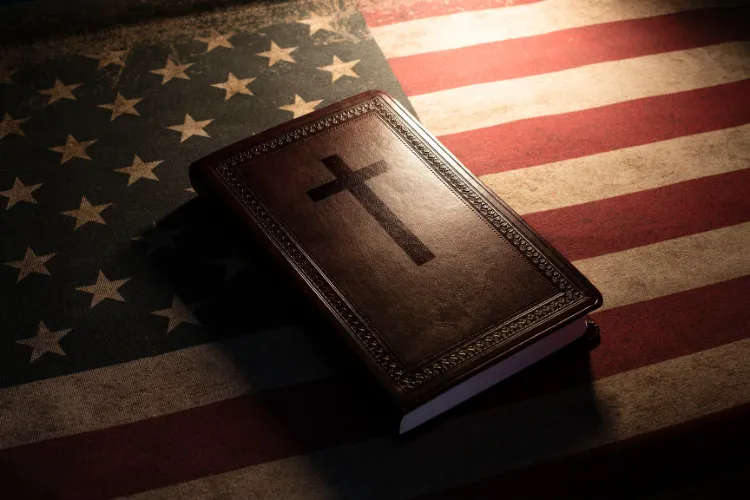
Judeo-Christian Values in a Diverse America
“It is the duty of all Nations to acknowledge the providence of Almighty God, to obey his will, to be grateful for his benefits, and humbly to implore his protection and favor” - George Washington
Summary:
✍️ This post explores the role of Judeo-Christian values in American social policy, addressing concerns about religious inclusion and diversity. Can these values unite a divided nation, or do they exclude those with differing beliefs? Discover the historical and moral foundations shaping America today.

💬 "Please Stand..."
The familiar toll of the elementary school PA system called my fifth grade class to attention, making us aware it was nearly time for one of our daily morning rituals.
Being a religious person and American citizen from birth, I considered the sound to be a sort of call to prayer, and I treated the opportunity to participate with no less solemnity than I might typically approach my evening prayers.
Perhaps that's the way I was raised, or perhaps my understanding of the sacrifices that were made on my behalf prompted my reverence.
Regardless, as I placed my hand over my heart and the familiar drone of the United States Pledge of Allegiance filled my ears with the words “one nation, under God, indivisible, with liberty and justice for all,” I felt the hope of a unified people endowed by God to do great things burn within my heart.
Looking back, I recognize not all people feel the way I do about those words.
In a nation where racial, political, and religious injustices leave deep scars, some question whether the Biblical God whom the founders claimed inspired this nation really ought to play a part in America's future.
Diverse perspectives and politicized religion sow fear that adherence to traditional Judeo-Christian values in American social policy (meaning the customs and practices of local governments and people) will exclude minority groups from the American dream and restrict free will.
Others believe adherence to Judeo-Christian values is the best way to preserve social order.
With competing viewpoints threatening to divide America, it is worth considering:
What effect do Judeo-Christian values in American social policy have on diversity and inclusion?
👉 But first, context
Before exploring the answers to this question, allow me to define what is meant by Judeo-Christian values.
Over time the term “Judeo-Christian values” has held many meanings. The term first gained wide popularity in the United States as a way to differentiate the Biblical values of American society from the atheistic policy of the Soviet Union (Haynes 70).
Later, the term came to represent “the complementary ideas of free will, the moral accountability of the individual rather than the group, the spiritual imperative of imperfect man’s struggle to do what is right and the existence of true moral law in the teachings of Christ and the Jewish prophets” (Hartmann 221).
In more recent times, Republican President Donald Trump has reinvigorated the term, although his definition of the term appears to primarily refer to public prayer and personal piety (Haynes 70).
For purposes of this exploration, the definition of Judeo-Christian values will include the complementary ideas outlined by Hartmann combined with a general adherence to the principles of the 10 Commandments found in Exodus.
⛪ Let's Talk About Separation of Church and State
A major concern of those who oppose Judeo-Christian values playing a role in American social policy is the importance of maintaining religious freedom (thereby protecting diverse perspectives) by enforcing separation of church and state.
The founders of the United States wisely enshrined the separation of church and state in the United States Constitution under the First Amendment which states “The government cannot make laws that establish a religion or prohibit the free exercise of religion.”
This amendment ensures the government can not interfere with the personal belief and conscience of the people.
However, while the founders intended there to be a separation of church and state, I believe they never intended for there to be a separation of state and God.
George Washington, the first president of the United States proclaimed, “it is the duty of all Nations to acknowledge the providence of Almighty God, to obey his will, to be grateful for his benefits, and humbly to implore his protection and favor” (Institution).
Nearly a century later, President Ronald Reagan reinforced this idea when he famously stated: If we ever forget that we're one nation under God, then we will be a nation gone under (Reagan).
In these statements, both Washington and Reagan clearly illustrated that American society, and by extension her social policy, ought to be rooted in Judeo-Christian values.
⛰️ A Firm Foundation
But if America is to be a nation rooted in Judeo-Christian values, won’t that exclude individuals and groups who do not identify with Biblical descriptors?
This is a valid concern voiced by those who cherish the American melting pot.
Middlebury College Professor Shalon Goldman voiced this concern when he claimed the term Judeo-Christian is “defined by exclusion… It’s essentially saying our values are not the values of the Enlightenment or the Constitution, but instead our values are the values of the Bible” (Haynes 69).
What professor Goldman fails to realize, however, is that the values of the Enlightenment and the Constitution were inspired by the values of the Bible and extend to all people regardless of their religious affiliation.
One study actually found that “appeals to a unified Judeo-Christian tradition were increasingly offered to establish the moral grounds for integrating other previously marginalized or excluded religious as well as racial minorities” (Hartmann 211).
Like a waterhole that brings creatures from every stage of the food chain together, Judeo-Christian values create the moral base necessary for people of diverse cultures and persuasions to coexist in peace.
🤷♂️ What of Morality?
Still, some may claim Biblical values are unnecessary because people can have good morals without religious implications.
It is true that most people have an innate sense of right and wrong; my religious tradition as a member of the Church of Jesus Christ of Latter-Day Saints proclaims that the conscience is the light of Christ which “influences people for good and prepares them to receive the Holy Ghost” (Light).
With that added understanding, it becomes impossible to separate personal morals from religious implications because conscience comes from God.
Furthermore, as a people we generally take for granted the biblical inspiration for the values we share; “the idea of a just and moral law, applicable to all, can be traced back to these biblical roots” (Smith 408).
Whether we recognize it or not, the values held dear by American society are Biblical in nature and society grows stronger together when faith-based values are shared.
And if there is any lingering doubt about the impact of Judeo-Christian values on inclusion, one may find it interesting that several large cross-national studies, as reported by Tomas Ståhl from the University of Illinois, found atheists to be “less inclined to endorse moral values that serve group cohesion (the binding moral foundations)” (Ståhl).
Taking these factors together, it becomes clear that a society rooted in Judeo-Christian, faith-based values generally will be more deeply rooted in the moral mooring which permits greater opportunities for inclusion of diverse peoples.
🗽 Liberty and Justice for All
Today I no longer stand together with my peers to recite the Pledge of Allegiance at the start of every day, but the unifying sense of belonging I experienced in that elementary classroom stirs in my heart each time I see an American flag.
There is something profoundly meaningful about the experience of coming together with people of all shapes, colors, and backgrounds to honor a common cause—to uphold common beliefs.
It is my firm belief that an American social policy built on Judeo-Christian values promotes inclusion and protects diversity.
Through these common values, America can achieve its stated mission to be “one nation, under God, indivisible, with liberty and justice for all.”
Sources
Hartmann, Douglas, Xuefeng Zhang, and William Wischstadt. "One (Multicultural) Nation Under God? Changing Uses and Meanings of the Term "Judeo-Christian" in the American Media." Journal of Media and Religion, vol. 4, no. 4, 2005, pp. 207–234, https://doi-org.byu.idm.oclc.org/10.1207/s15328415jmr0404_1, doi:10.1207/s15328415jmr0404_1.
Haynes, Jeffrey. "Donald Trump, “Judeo-Christian Values,” and the “Clash of Civilizations”." The Review of Faith & International Affairs, vol. 15, no. 3, 2017, pp. 66–75, https://doi-org.byu.idm.oclc.org/10.1080/15570274.2017.1354463, doi:10.1080/15570274.2017.1354463.
Institution, Smithsonian. "George Washington's Thanksgiving Proclamation." , https://www.si.edu/spotlight/thanksgiving/proclamation.
“Light of Christ.” Homepage - The Church of Jesus Christ of Latter-Day Saints, Church of Jesus Christ of Latter-Day Saints, 1 Jan. 2023, www.churchofjesuschrist.org/study/manual/gospel-topics/light-of-christ?lang=eng.
Reagan, Ronald. "Remarks at an Ecumenical Prayer Breakfast in Dallas, Texas." , https://www.reaganfoundation.org/ronald-reagan/reagan-quotes-speeches/remarks-at-an-ecumenical-prayer-breakfast-in-dallas-texas/.
Smith, Anthony D. "Biblical beliefs in the shaping of modern nations." Nations and Nationalism, vol. 21, no. 3, 2015, pp. 403, doi:10.1111/nana.12131.
Ståhl, Tomas. "The amoral atheist? A cross-national examination of cultural, motivational, and cognitive antecedents of disbelief, and their implications for morality." PLOS ONE, vol. 16, no. 2, 2021, doi:10.1371/journal.pone.0246593.
🦅 Follow us on social media for more American content 🦅
www.american-providence.org/link-in-bio
🇺🇸🇺🇸🇺🇸



X
Facebook
Instagram
Youtube
TikTok